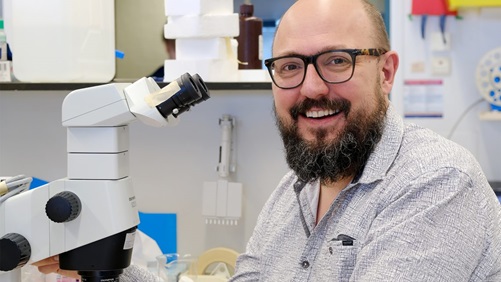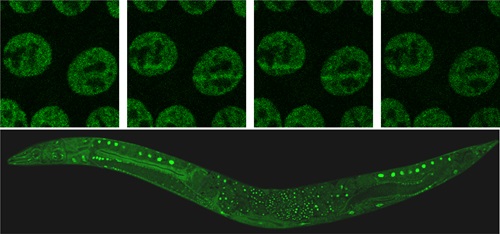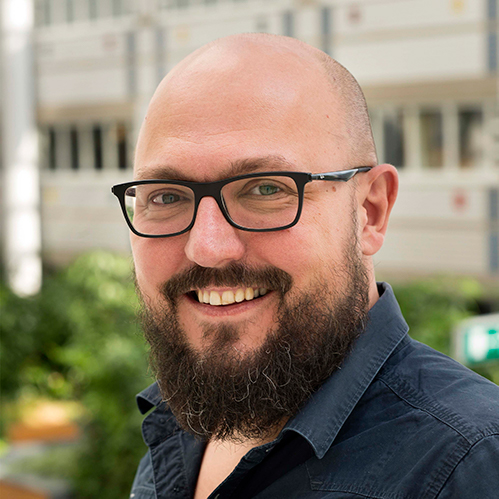About Dr. H. (Hannes) Lans, PhD
Introduction
About Hannes Lans
Hannes Lans received his PhD from the Erasmus University, Rotterdam, The Netherlands, in 2005. In 2008, he received a Veni grant from the Dutch Research Council (NWO) and an AICR grant that enabled him to develop his own research line, utilizing both C. elegans and mammalian cells to study the DNA damage response.
Currently, he is an associate professor at the Department of Molecular Genetics, Erasmus MC. His research focuses on the mechanisms and regulation of nucleotide excision repair and interstrand crosslink repair, in relation to cancer therapy and genetic disease.
For more information, email to w.lans(at)erasmusmc.nl or visit Lans Lab
Field(s) of expertise
Both nucleotide excision repair and interstrand crosslink repair are important DNA repair pathways that remove a wide variety of helix-distorting DNA lesions and DNA crosslinks from the genome. Both pathways protect healthy cells against cancer and aging, but also help cancer to overcome cancer chemotherapy. Using mammalian and C. elegans cell biological and genetic tools, our group aims to understand the mechanisms that control DNA repair activity in different cell types, including in postmitotic, differentiated cell types in vivo and in different types of cancer cells.
We specifically try to understand how DNA repair protects cancer cells against chemotherapy. Also, we study how hereditary defects in DNA repair lead to different genetic diseases, such as xeroderma pigmentosum and Cockayne syndrome.

More information can be found at our lab’s webpage: Lans Lab.
Publications
All publications of Hannes Lans on Pubmed

Selected recent publications:
Muniesa-Vargas A, Davó-Martínez C, Ribeiro-Silva C, van der Woude M, Thijssen KL, Haspels B, Häckes D, Kaynak ÜU, Kanaar R, Marteijn JA, Theil AF, Kuijten MMP, Vermeulen W, Lans H (2024) Persistent TFIIH binding to non-excised DNA damage causes cell and developmental failure Nature Communications 15:3490
Theil AF, Häckes D, Lans H (2023) TFIIH central activity in nucleotide excision repair to prevent disease DNA Repair 132:103568.
van der Woude M, Davó-Martínez C, Thijssen KL, Vermeulen W, Lans H (2023) Recovery of protein synthesis to assay DNA repair activity in transcribed genes in living cells and tissues Nucleic Acids Research 51:e93
Davó-Martínez C, Helfricht A, Ribeiro-Silva C, Raams A, Tresini M, Uruci S, van Cappellen WA, Taneja N, Demmers JAA, Pines A, Theil AF, Vermeulen W, Lans H (2023) Different SWI/SNF complexes coordinately promote R-loop- and RAD52-dependent transcription-coupled homologous recombination Nucleic Acids Research 51:9055-9074
Thijssen KL, van der Woude M, Davó-Martínez C, Dekkers DHW, Sabatella M, Demmers JAA, Vermeulen W, Lans H (2021) C. elegans TFIIH subunit GTF-2H5/TTDA is a non-essential transcription factor indispensable for DNA repair Communications Biology 4:1336
Sabatella M, Thijssen KL, Davó-Martínez C, Vermeulen W, Lans H (2021) Tissue-Specific DNA Repair Activity of ERCC-1/XPF-1 Cell Reports 34:108608
Ribeiro-Silva C, Sabatella M, Helfricht A, Marteijn JA, Theil AF, Vermeulen W, Lans H (2020) Ubiquitin and TFIIH-stimulated DDB2 dissociation drives DNA damage handover in nucleotide excision repair Nature Communications 11:4868
Lans H, Hoeijmakers JHJ, Vermeulen W, Marteijn JA (2019) The DNA damage response to transcription stress Nature Reviews Mol Cell Biol 20:766-784
Teaching activities
Hannes Lans teaches in the Nanobiology BSc program and MSc of Erasmus University and Delft University, where he is course manager and teacher of the Genetics course and course manager and teacher of the Project Development course. He also teaches in the Molecular Medicine MSc program of Erasmus MC, of which he is faculty member.

More
For more reading on the topic of our research, see the following reviews:
Theil AF, Häckes D, Lans H (2023) TFIIH central activity in nucleotide excision repair to prevent disease. DNA Repair 132:103568.
Muniesa-Vargas A, Theil AF, Ribeiro-Silva C, Vermeulen W, Lans H (2022) XPG: a multitasking genome caretaker. Cellular Molecular Life Sciences 79:166
Lans H, Hoeijmakers JHJ, Vermeulen W, Marteijn JA (2019) The DNA damage response to transcription stress. Nature Reviews Mol Cell Biol 20:766-784
Lans H, Vermeulen W (2015) Tissue specific response to DNA damage: C. elegans as role model DNA Repair 32:141-148







